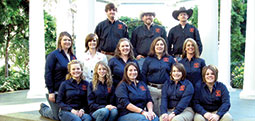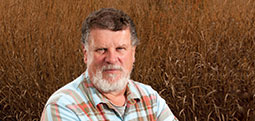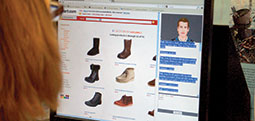| Current Issue | Past Issues | Subscribe | Ag Homepage |

Field of Opportunities
with Ag Degrees by
In January 2012, an article posted on Yahoo.com created a stir in the agricultural community nationwide. Titled “College Majors That Are Useless,” the piece by blogger Terence Loose listed agriculture, animal science and horticulture as three of the five most worthless degrees out there in terms of job prospects.
Based largely on employment projections from the U.S. Department of Labor and the author’s personal opinion, Loose’s list of “dud degrees” was a classic case of “don’t believe everything you read on the Internet.”
In fact, across the nation, colleges of agriculture are seeing enrollment numbers increase, and a key factor fueling that growth is the highly promising employment outlook for ag majors, says the Auburn University College of Agriculture’s Paul Patterson.
“Nationally, we are seeing an increased demand for graduates with degrees in agriculture, as agribusiness firms try to both gear up for a projected growth in global demand and replace retiring baby boomers,” says Patterson, associate dean for students.
Another phenomenon, however, is at play, too: a growing desire by students to find solutions to some of the world’s most pressing problems, such as hunger and obesity.
“Students are recognizing the tremendous global challenges we face with regard to food supplies, energy needs, human health and the environment and are seeing majors in agriculture as a way of preparing themselves to make meaningful contributions,” Patterson says.
Both factors figured into Auburn sophomore Courtney Ennis’s decision to major in poultry science.
“I chose my degree because I think agriculture is extremely important to the world,” Ennis says. “It's what feeds, clothes and houses everyone. I know I can help make a difference by studying in this field.
“I know that in today's society, it's getting harder and harder for people to find jobs,” she says.
“With agriculture, I don't think I'll have to worry too much about that.”
Garrett Dixon, a College of Ag junior majoring in the “useless” field of animal sciences, echoes that thought.
“When times get tough, people will make choices on what they can and cannot afford,” Dixon says. “There are many luxuries that we enjoy that we can do without, but food is not one of them.”
The numbers indicate Ennis and Dixon are right. Several degrees in Auburn’s College of Agriculture—including poultry science, horticulture, turfgrass management and agricultural communications—boast 100 percent job placement of graduating seniors, and the rate is high among food science and environmental science graduates, too.
This past spring, world population topped the 7 billion mark, and experts predict the number will grow to 9 billion by the year 2050. Analysts say that, in order to meet a population growing at this rate, agriculture will have to produce 100 percent more food than what was produced in the year 2000. This challenge is what draws many students to the College of Agriculture. Given today’s uncertain economy, high unemployment and rising college costs, students want marketable degrees that lead to good jobs and rewarding careers, and they’re finding that in ag.
“The word ‘agriculture’ has so many meanings today—it is more than just cows, sows and plows,” says Amanda Martin, student services coordinator in the college. “The students involved in our programs want to make a difference in their communities, in their states and in the world, and our programs in the College of Agriculture allow them to do just that.”
Take Joshua Carter, for instance. Carter is a junior who this fall changed his major from pre-med in the College of Sciences and Mathematics to agronomy and soils in the College of Ag.
"I came to Auburn wanting to make a difference in the world by studying diseases of humans and pursuing a pre-med degree, but now I'm learning about diseases of plants and the importance of agricultural science,” Carter says. “What I've discovered is that this is a vitally important applied science that has far-reaching and profound effects on human health.
“In the College of Agriculture, I not only saw a difference in the material I was learning, but in the people as well,” he says. “I've had nothing but supportive and friendly experiences with both the professors and students. It's a great atmosphere in class, out of class and even in the clubs that I'm a part of."
Horticulture sophomore Savannah Duke agrees.
“My first impressions with the people in my department just made my choice even easier,” Duke says. “Everyone wanted to help me get settled in and succeed.”
One concept that sets the College of Agriculture apart from all other colleges and schools at Auburn is its academic advising system. All Auburn undergraduates have academic advisers within their colleges and must meet with them at least once a semester to register for the next semester’s classes. While in other colleges and schools across campus, non-faculty employees serve as advisers to students who have been assigned to them on an alphabetical basis, College of Ag advisers are actually faculty members in students’ specific fields of study. Since many advisers also teach their advisees, this provides a great deal of interaction between faculty and students.
“Many of the faculty are like my second parents,” says junior animal sciences major Hannah Taylor. “They know what is going on in my life and what my career aspirations are and are there to help me accomplish them.”
The College of Ag’s advising system is beneficial for both students and faculty, says agricultural economics professor Patricia Duffy, who has been advising students since she joined the College of Ag faculty in 1985.
“We have the chance to really get to know our students so that they’re more than just names on a roll or grades, and then when they need reference letters or letters of recommendation, they know they can come to us,” Duffy says. “And because we know our students, that helps us pick up on warning signs or red flags—say, a good student suddenly starts making poor grades—that indicate there’s an issue or a problem that needs to be dealt with, and we can be there to help them through those times.”
Although advising as many as 15 or 20 students through an academic year is a time-intensive task, it has its rewards, Duffy says.
“We get to know some really neat people that we might not have if we only had them in a class,” she says. “We watch them grow and mature, and a lot of times, the relationships don’t end when they graduate. I have several former advisees who, if they’re in Auburn, will come by to visit.”
December 2012
Ag Illustrated

At Your Service
Learn Business Skills
by







